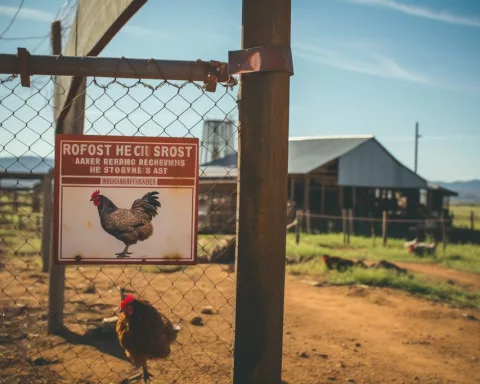South Africa is facing a bird flu crisis caused by two strains of highly contagious avian influenza that have already killed millions of birds. The emergence of the H7N6 strain, which first appeared in June 2023, has alarmed experts as it is well-adapted to infecting chickens and can easily spread between birds and farms. The crisis has revealed flaws in the country’s biosecurity measures and prompted calls for innovative solutions to combat the virus’s spread, including new vaccination strategies and compensation for farmers who comply with culling measures. Despite the outbreak, poultry products remain safe for consumption, with no evidence of human infection from the current virus.
What is the unexpected bird flu crisis in South Africa?
South Africa is currently facing a severe outbreak of avian flu impacting both wild birds and poultry. The highly contagious viral infection is caused by two strains: A(H5N1) and influenza A(H7N6). The latter, a highly pathogenic strain of H7N6 avian influenza, is the primary cause for concern and has already led to the death of millions of birds. This unexpected crisis has revealed flaws in the country’s biosecurity measures and prompted calls for innovative solutions to combat the virus’s spread.
South Africa is currently facing a severe outbreak of avian flu impacting both wild birds and poultry. The highly contagious viral infection is caused by two strains: A(H5N1) and influenza A(H7N6). The latter, a highly pathogenic strain of H7N6 avian influenza, is the primary cause for concern and has already led to the death of millions of birds. This unexpected crisis has revealed flaws in the country’s biosecurity measures and prompted calls for innovative solutions to combat the virus’s spread.
The Emergence of the H7N6 Strain
The H7N6 strain first appeared in June 2023 near Johannesburg and is a novel mutation originating from wild birds. Its rapid spread has alarmed experts as it is well-adapted to infecting chickens and can easily spread between birds and farms. The strain has already infected an estimated 10 million birds, killing 6 million, while an earlier outbreak of H5N1 claimed an additional 1.7 million bird lives.
Traditional biosecurity measures, such as restricting human and vehicle movement on farms, seem to be less effective in controlling the disease’s spread. Strict protocols have been implemented to prevent transmission, including showering, changing clothes, and disinfecting footwear for those entering farms. Furthermore, measures are in place to ensure wild birds, which have been associated with the spread of avian flu, are kept away from chicken sheds.
The Worldwide Proliferation of HPAI H5 Viruses
Highly pathogenic avian influenza (HPAI) H5 viruses have been spreading globally for nearly a decade, primarily through wild bird migrations. South Africa experienced its first outbreak of HPAI H5 viruses in 2017, followed by a second in 2020. Experts anticipated that a subsequent outbreak would also be caused by H5 strains, and the first reported cases in the coastal regions were indeed H5-related. However, the unexpected emergence of the H7N6 strain has raised concern among experts.
The H7N6 virus is thought to have mutated from a low pathogenicity avian influenza (LPAI) strain that was already circulating in wild birds. This mutation is considered a local occurrence and has taken place in various parts of the world.
Government Intervention and Difficulties
As a “controlled disease,” avian influenza falls under strict government control aimed at eradicating outbreaks as quickly as possible. Upon detection, affected farms are immediately quarantined, and surviving birds are destroyed to prevent further spread. However, the state veterinary services face challenges in managing outbreaks, including a lack of resources and limited cooperation from farmers.
Unlike the EU and the US, where farmers are compensated for culling, South Africa does not provide compensation, making it difficult to enforce compliance. As a result, infected birds are often sold and moved off farms, exacerbating the disease’s spread.
Seasonal Patterns and Innovative Approaches
HPAI outbreaks tend to occur seasonally, with more cases in the winter and fewer in the summer. This pattern may be linked to reduced viral survival in hotter weather. To address the current crisis, experts are advocating for new strategies, such as introducing suitable vaccines that could minimize losses and slow the disease’s spread. While vaccines cannot prevent infection, they can help manage infection levels and spread.
However, South Africa faces challenges in implementing a vaccination strategy due to limited vaccine options and the need to ensure that vaccines are effective against local strains. Poorly matched vaccines will not be effective against outbreak strains, necessitating time and effort from both government and industry.
Consumer Safety and Human Risk
Despite the avian flu outbreak, the South African Poultry Association maintains that poultry products are safe for consumption. In collaboration with the University of Pretoria, they have sequenced the H7 avian influenza virus, finding no evidence of amino acid markers that enable the virus to bind to mammalian cells. As a result, human infection from the current virus is considered highly unlikely. However, the situation serves as a stark reminder of the need for vigilance and innovation in addressing the ever-present threat posed by viral infections.
What strains of avian flu are causing the crisis in South Africa?
The crisis in South Africa is caused by two strains of avian influenza: A(H5N1) and influenza A(H7N6). The latter strain, a highly pathogenic strain of H7N6 avian influenza, is particularly concerning as it has already caused the death of millions of birds.
When did the H7N6 strain first appear?
The H7N6 strain first appeared in June 2023 near Johannesburg.
What measures have been implemented to prevent transmission of the virus?
Strict protocols have been implemented to prevent transmission, including showering, changing clothes, and disinfecting footwear for those entering farms. Furthermore, measures are in place to ensure wild birds, which have been associated with the spread of avian flu, are kept away from chicken sheds.
Why are traditional biosecurity measures less effective in controlling the disease’s spread?
Traditional biosecurity measures, such as restricting human and vehicle movement on farms, seem to be less effective in controlling the disease’s spread due to the highly contagious nature of the H7N6 strain.
Is South Africa compensating farmers for culling?
Unlike the EU and the US, where farmers are compensated for culling, South Africa does not provide compensation, making it difficult to enforce compliance.
What strategies are experts advocating for to address the crisis?
To address the current crisis, experts are advocating for new strategies, such as introducing suitable vaccines that could minimize losses and slow the disease’s spread.
Are poultry products safe for consumption?
Despite the avian flu outbreak, the South African Poultry Association maintains that poultry products are safe for consumption. Human infection from the current virus is considered highly unlikely.
What challenges does South Africa face in implementing a vaccination strategy?
South Africa faces challenges in implementing a vaccination strategy due to limited vaccine options and the need to ensure that vaccines are effective against local strains.












